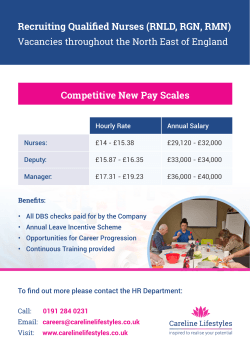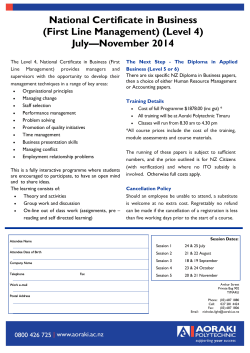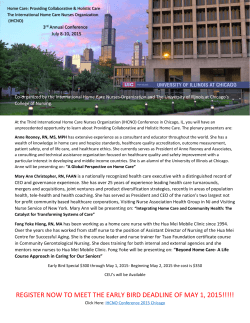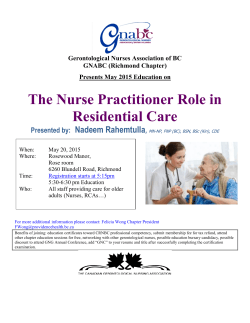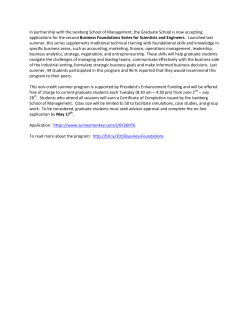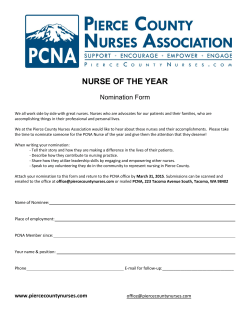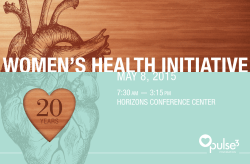
Transition to practice and the theory of organisational socialisation
Transition to practice and the theory of organisational socialisation for newly qualified graduate nurses Dr Craig Phillips March-April 2015 Acknowledgements • This study tour has been funded by a travel grant award on behalf of the University of South Australia. • I also wish to acknowledge the Nurses Memorial Foundation of South Australia Incorporated, who have funded the current intervention trial. Presentation content • Brief overview and findings from Doctoral thesis • Adaptation of the model of Organisational Socialisation • Current intervention trial at two South Australian hospitals Background 3 year nursing degree Student loan from government-Higher Education Contribution Scheme Most students work due to being broke 85% engage in paid employment 15 or more hours per week Perceived advantage of employment in clinical settings. If this is true, then all undergraduate nursing students should work in clinical settings and not retail ones. My thesis was all about, Does it really matter what paid employment undergraduates do in relation to preparation for graduate transition? Background Recently completed doctoral study Focus on pre-registration paid employment choices: • Employment in a health service Enrolled nurses All other health care roles • Employment in hospitality and retail sector • Non-participation in paid employment Methods Three phase exploratory retrospective mixed method design • Focus groups with new graduate nurses (n=68) • Survey questionnaire with new graduate nurses (n=392) • Secondary analysis of above two data sets Study findings Reasons for working: • $$$$$$$$$$$ • Experience of the work place • Advantages for pending transition. Study findings Transition index (TI) score: 1 (worst transition possible) to 10 (brilliant transition) Mean of TI scale by employment type: • • • • All clinical roles Hospitality and retail sector Enrolled Nurses Did not work 7.22 7.05 6.65 6.27 (n=152/39%) (n=95/24%) (n=82/21%) (n=63/16%) So…. No statistically significant difference between 3 employment types, but there was significance between working and no work. Therefore, Better to have engaged in some form of undergraduate paid employment than not to…however, choice of employment in relation to impact on transition is arbitrary. If the type of work undertaken in the final year is not associated with good transition, would it be that post-registration factors determine transition success? Post registration factors We examined: Dealing with sick and complex patients, orientation to new job, preceptorship, study days, roster that addressed work/life balance. Family orientated environment, being respected by colleagues, Being involved in the team, friendly/supportive staff, having confidence recognised/rewarded, being receptive to my learning needs. All factors were rated for importance and satisfaction, using multiple linear regression, we found 3 factors were best able to predict transition success… And these are… • A comprehensive and enduring orientation • Patient allocation with an acuity reflecting the beginning skill set of a neophyte practitioner • Respectful feedback from colleagues (particularly senior nurses) As well as these factors, there were issues made by hospital management about the previous employment that graduates had done! In addition… Recommendations from the study suggest: • Transition is an individual process regardless of previous life experiences • All forms of paid employment should be encouraged • Additional considerations for mature aged and international graduates • Formal testing of Bauer and Erdogan’s (2011) model of the theory of organisational socialisation in an intervention trial Concerns with transition Graduate nurse turnover and attrition • Australia 20% • Globally 20-60% Implications for workforce planning Implications for patient safety Economic considerations Our findings suggest that successful transition to practice is an individual construct rather than a homogenous framework Concerns for graduate nurses • Generic orientation programs ‘there was not enough initial practical orientation to the wards and then again in specialty unit areas. My transition was very poor, but would have been so much better with more skilful preceptoring, ongoing mentoring, increased supernumerary time, and more supervision by grad nurse educators’ • Issues with bullying and horizontal violence ‘none of my prior knowledge and skills were recognised…many senior RNs were such poor role models, gave very little feedback and support…nurses educators tried to knock me down and I lost my passion for nursing’ Concerns for graduates • Lack of support, constant need to ‘fit in’ ‘ I have been given a really hard time, so much so that I hate the wards…nurses slagging me off, treating me like an idiot’ ‘there was NO interest by the nursing unit manager, you are not paid to be here to think, but only to work’ Is there a better solution to transition to practice? A theory of organisational socialisation Organisational socialisation is defined as: a process where a new employee learns the processes and rules of a particular role, thereby acquiring the necessary knowledge and skills to function in that role (Saks and Ashforth, 1979). Furthermore: Bauer and Erdogan (2011), suggest that organisational socialisation, or onboarding, results in new employees moving from organisational outsiders to organisational insiders. Phase One Phase Two Phase Three New employee characteristics •Proactive personality •Extraversion •Openness •Veteran employee New employee behaviors •Information seeking •Feedback seeking •Relationship building • • • • Organisational efforts •Socialisation tactics •Formal orientations •Recruitment/realistic previews •Organisational insiders Adjustments Role clarity Self-efficacy Acceptance by organisational insiders Knowledge of organisational culture • • • • Outcomes Satisfaction Commitment Turnover Performance Adaptation of Bauer and Erdogan’s (2011) model of the process of socialisation based on our research findings. Phase One Phase Two Phase Three New graduate nurse characteristics •Personality •Life experience •Academic education •Previous undergraduate paid employment experience New graduate nurse behaviours •Information seeking •Feedback seeking •Relationship building • • • • Health service efforts •Poor orientation •Inappropriate patient allocation •Lack of respect •Incorrect assumptions Adjustments Role ambiguity Non-acceptance by organisational insiders Lack of knowledge of organisational culture Loss of confidence and increased patient risk • • • • • Outcomes Decreased satisfaction Decreased commitment Increased turnover Decreased performance Risk to patient safety An adaptation of the model of organisational socialisation for an ideal graduate nurse transition. Phase One New employee characteristics •Personality •Life experiences •Academic education •Undergraduate paid employment experiences New employee behaviors •Information seeking •Feedback seeking •Relationship building Phase Two • • • Organisational efforts •Socialisation tactics •Formal and informal orientations/follow up •Reduction of clinical rotations •Organisational insiders, preceptors and mentors •Acknowledgement of prior life experiences/skill sets Phase Three • Adjustments Thorough, effective and enduring orientation(s) Appropriate patient allocation Respect for a job well done • • • Outcomes Improved satisfaction Increased commitment Decreased turnover Increased performance Current intervention study Based on the findings from the PhD • Rigorous orientation • Appropriate patient allocation • Respectful feedback Intervention trial to improve transition experiences and equally to inform health services so they may respond. Current study cont… Based on the transition index (TI) scale developed by Phillips et al. (2012) we hypothesise that mean TI score of 7 can be increased to 88.5 Baseline (control group) of graduate nurses who completed their transition to professional practice program (TPPP) in 2014, completed a survey https://www.surveymonkey.com/s/FQ6XYXP The 2015 (experimental group) of graduates who undertake their TPPP are completing a monthly survey rating satisfaction with transition to practice experiences. https://www.surveymonkey.com/s/L3GBMRK Study design 2014 Graduate Baseline survey 2015 Graduates Monthly survey 2015 graduate nurses repeat 2014 baseline survey, to ascertain increase in satisfaction scores. Quality assurance feedback loop to hospital management Preliminary findings 2014 survey: • 80% worked (Clinical 60%, EN 20%, Hospitality/retail 20%). 3 factors seen as most helpful for transition: • Conflict resolution, 3.78/5 • Patience, 4.33/5 • Teamwork, 4.22/5 Cont… Question 4 Importance of: Dealing with sick and complex patients, orientation to new job, preceptorship, study days, roster that addressed work/life balance. Family orientated environment, being respected by colleagues, Being involved in the team, friendly/supportive staff, having confidence recognised/rewarded, being receptive to my learning needs. All of these factors rated 4/5 or higher Cont… Question 5 Satisfaction with: Of the identical factors highlighted in question 4, it appears that importance rates more highly than satisfaction. Only graduate nurse study days, dealing with sick and complex patients, friendly staff and respect by colleagues rated higher than 4/5 Question 6 TI score slightly higher than original study, smaller study, only views from two health services. Cont… Question 7: Response to transition index score ‘Overall, it has been a good experience for my TPPP in 2014. I have definitely gained confidence in both my clinical knowledge and professional skills... However, each rotation takes about 4 to 6 weeks for me to settle in, especially, moving from a specialty area, for example, peri-operative nursing, to a general ward environment’ The good, the bad and the ugly ‘Supported environment that allowed for professional development as a registered nurse’ ‘The constant supervision and the mistrust of some nurses and patients’ ‘All areas need to have a preceptor program so issues can be managed in an appropriate and timely manner, not having one is just dangerous!’ Current 2015 graduates…satisfied? 37 participants to date. Question 1: 80% satisfied Questions 2-5: Satisfaction with clinical progress, orientation, patient allocation, and respect all at 3.5 Still some work to do… ‘Have not received constructive feedback throughout the program, whether it be positive or negative…feel like I'm lagging behind but nobody has told me formally’ ‘Safe allocation of patients fluctuates greatly in the critical care area…When an influx of patients arrive…it can be overwhelming to have the responsibility to determine priorities and can often leave a feeling of failure to provide timely care... I am beginning to understand this may not just be my inexperience in this department, but possibly an accepted thought process among the nurses who work there’ References Bauer, T., Erdogan, B., 2011. Organizational socialisation: The effective onboarding of new employees. In Zedeck, S., (Ed), APA handbook of industrial and organizational psychology, Volume 3: Maintaining, expanding, and contracting the organization. APA Handbooks in Psychology. 51-64. Washington, DC, US: American Psychological Association, viii, 960 pp. doi:10.1037/12171-002 Phillips, C., Kenny, A., Smith, C., Esterman, A., 2012. Pre-registration paid employment choice: The views of newly qualified nurses. Nurse Education Today 32 (1), 10-14. Phillips, C., Esterman, A., Smith, C., Kenny, A., 2013. Successful Transition to Registered Nurse Practice. Journal of Advanced Nursing 69 (6), 1314-1322. Phillips, C., et al., A secondary data analysis examining the needs of graduate nurses in their transition to a new role, Nurse Education in Practice (2013), http://dx.doi.org/10.1016/j.nepr.2013.07.007 Phillips, C., et al., Does the choice of pre-registration paid employment impact on graduate nurse transition: An Australian study. Nurse Education Today (2013), http://dx.doi.org/10.1016/j.nedt.2013.06.024 Phillips, C., et al. Pre-registration paid employment practices of undergraduate nursing students: A scoping review, Collegian (2014) http://dx.doi.org/10.1016/j.colegn.2014.09.012 Phillips, C., et al. The theory of organisational socialisation and its potential for improving transition experiences for new graduate nurses, Nurse Education Today (2015) http://dx.doi.org/10.1016/j.nedt.2014.07.011 Rush, K., Adamack, M., Gordon, J., Lilly, M., Janke R., 2013. Best practices of formal new graduate nurse transition programs: An integrative review. International Journal of Nursing Studies 50, 345-356. Saks, A., Ashforth, B., 1997.Organisational Socialisation: Making Sense of the Past and Present as a Prologue for the Future. Journal of Vocational Behaviour 51, 234-279. Thanks for the great opportunity to speak to all the wonderful people in Vancouver!!! Any questions??
© Copyright 2025

